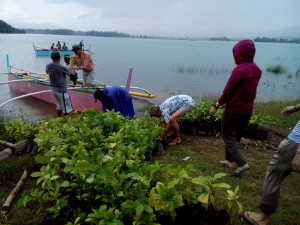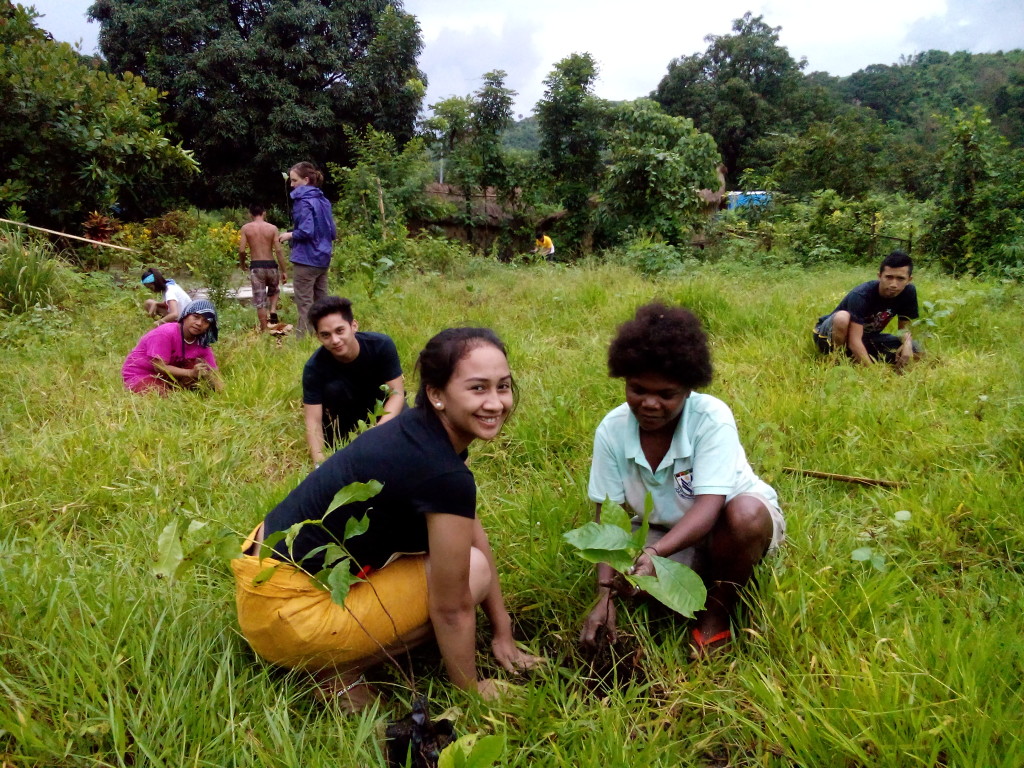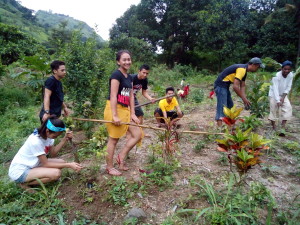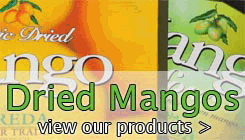 Organic training and plantingwith Aeta Indigenous people with Misereor .
Organic training and plantingwith Aeta Indigenous people with Misereor .
Introduction and extracts
by
Father Shay Cullen
Filipino and international volunteers have traveled to the villages of the Aeta Indigenous people in the past 18 months with Preda Fairtrade staff and agriculturists and community workers.
They joined in the planting of crops, trees like coconut, mangoes and coffee and joined them in their farming activities to be in solidarity and respect for their dignity, culture and their ancestral rights to the land. Continuous planting and nurturing of mangoes sapling, coconut and coffee bushes has the impact of increasing the livelihood of the Aeta people for the long term and strengthening their rights and claims to their ancestral lands and holding. This is very important in the face of the incursions of mining corporations, land-grabbers and would-be cattle ranchers.
The mountains of Zambales are rich in minerals. This is a big attraction to mining companies big and small to get concession in the ancestral domain. There is conflict arising among some Aeta communities since some fall into the trap of taking money and signing lease papers while others somewhat wiser rescue to do this. The project will continue to help resolve these growing conflicts and to bring about dialoged among the communities and work for a common agreement to preserve the lands and environment form the bulldozers and back-hoes that would damage the ecosystem and do away with the hill farms and many trees and pollute rivers and streams and disrupt the natural habitat of wild-life.
The majority of the Aeta people want to protect the environment of their ancestors and improve it. Most of the mountains and the primeval forests were cut down in the past 50 years by the logging corporations backed by corrupt politicians and corrupt officials. In 1901 the Philippines had 90% forest coverage. By 2000 (or earlier) there was only 3% left with rain forest according top Haribon an environmental research group. The most adversely affected were the indigenous people all over the Philippines.
They were forest dwellers, hunters and gathers and have become subsistence farmers now trying to restore the environment and grow there own food.They are very poor and education and medical assistance and good housing is far from their reach. Despite this they are striving to improve themselves through their own efforts and with the help of Preda and Misereor.
The project to create an organic area for mangoes, coffee coconut and other crops is working well. Much has been done and the report below will explain the success so far. The final outcome in 2015 has been the successful achievement of being certified organic in mango. After three years of building up a strong extensive internal control system among the Aeta people and with Preda agriculturists training them to implement the standards of organic certification they finally succeeded .
This is significant considering the low level of education, disorganized communities and the remoteness and many widespread villages. This was capped by the June harvest of mangos and the delivery of tones to the processing plant where they were made into organic mango puree for shipment to the fair trade cooperative of DWP.
The Preda-Misereor project has these goals as stated above. In the past 18 months there has been significant results here are a few extracts form the project report.
Preda News
· Planted 3,416 coconut seedlings, 500 grafted mango saplings and 1,102 wildlings/forest trees
· 1,000 grafted mango saplings and 800 coconut seedlings is ready for planting
· Conducted 43 area-based trainings to 18 Aeta communities/mango growers
· Conducted 5 center-based training for local organic inspectors
· Conducted 333 farm inspection visits
a. Health & Environment – Planting of forest trees and fruit bearing trees have a positive effect in the protection of the environment and at the same time provide non-timber source of income when they fruit trees bear fruits. Ecological balance is achieved. It will also help in reducing carbon dioxide into the atmosphere. The installation of the water hand pumps will ensure source of potable water supply and irrigation for backyard gardening in order to sustain their livelihood and provide nutritious food for the families.
b. Risk of Climate change – the fruit bearing of mango depends on the natural flowering, however, during the flowering months (January-February) unexpected rains and typhoons destroy the flowers resulting to low production or no harvest at all.
The project has created impact both economically and environmentally. Trees planted serve as a source of income and at the same time protection of the environment. The setting-up of mango buying gave them a good income thru FAIRTRADE, this give them market assurance for their mango harvest. Establishment of integrated farm and practicing organic farming gave the community a good place to live in. Health condition of the community improved because of the establishment of water hand pumps.
The RESTORATION, PRESERVATION and PROPER UTILIZATION OF THE NATURAL RESOURCES is generally sustainable. It sustains community empowerment as they PROTECT THE ENVIRONMENT. Since the project is a source of livelihood, the community will nurture and expand it.
The awareness generated through the project further strengthens the resolve of the communities to stop irresponsible mineral mining industry that threatens their lives and existence.
Despite the limitations and challenges, the project implementations is reasonably competent, effective and has resulted to positive impact on the lives of the beneficiaries and in protecting the environment. The beneficiaries expressed over-all satisfaction rating and wanted other projects to be initiated and continue further.
a. Approach:
– The concept of integrated organic farming has to be extensively expanded to include other fruit bearing trees, plants, vegetables, medicinal plants, etc., besides mango in order to create more sustainable aggro-forestry and agriculture project as short and long term income generating activity.
– The Aeta communities have deeper knowledge on organic/sustainable production of mangos.
– -They are in a better position to practice environment protection through reforestation, aggro-forestry and caring of the mango trees.
– -Through various livelihood projects that were introduced, the Aeta beneficiaries are able to establish additional sources of income.
– – At least 70% of the target group received trainings on integrated organic/natural farming method. New beneficiaries within the target communities joined the organic mango producers group. Therefore there is expansion of the membership.
– – Aside from planting mango saplings, the establishment of coconut and coffee was introduced and inter-crop. Planting was done as another strategy to sustain their source of livelihood in the future.
– – Ecological balance is also achieved by avoiding mono-cropping.
Father Shay Cullen
shaycullen@gmail.com



